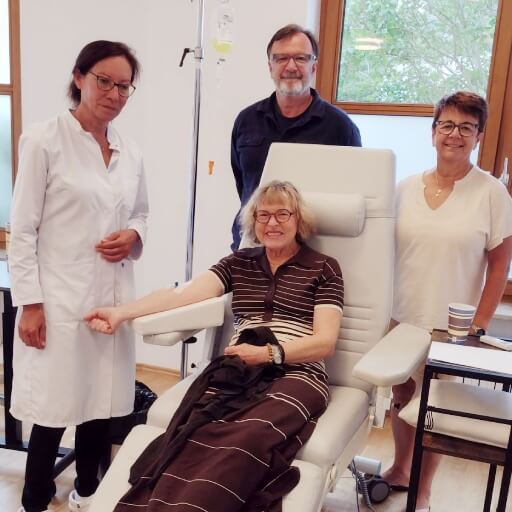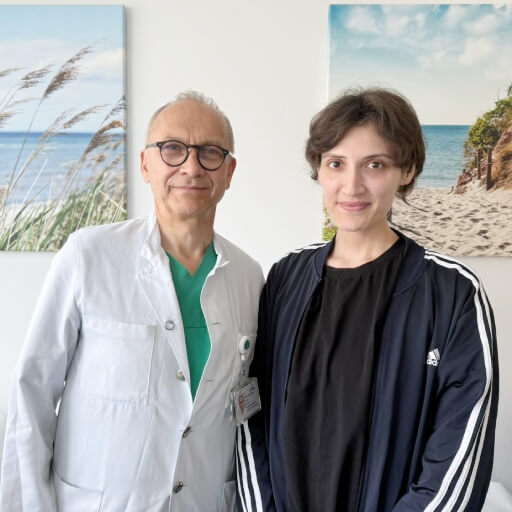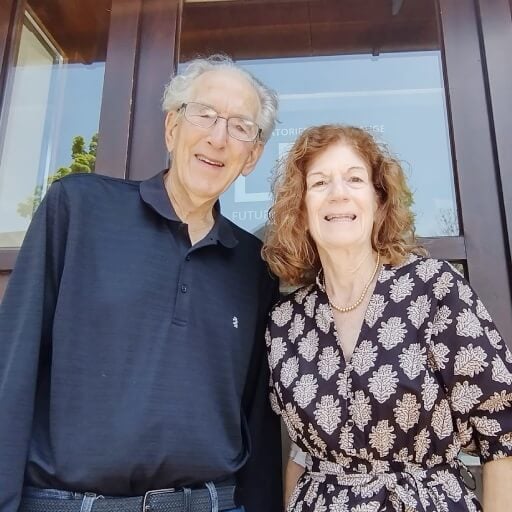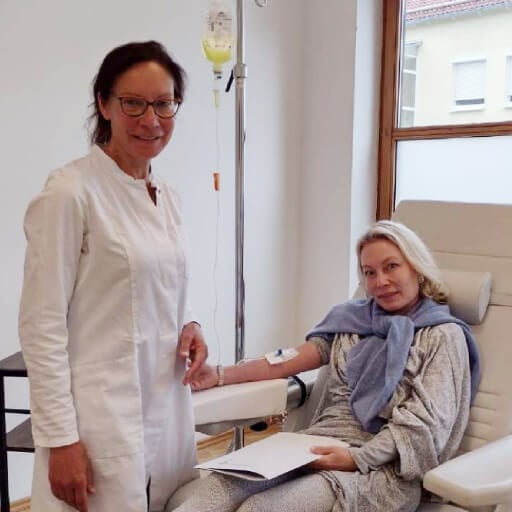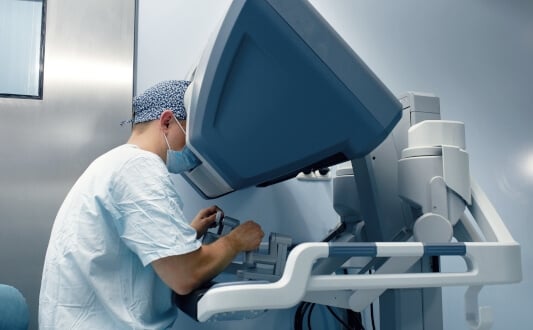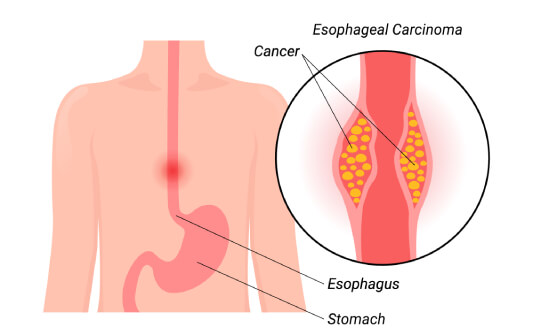يظل سرطان المريء أحد أكثر الأورام الخبيثة في الجهاز الهضمي فتكاً، وهو مسؤول عن حوالي واحدة من كل عشرين حالة وفاة مرتبطة بالسرطان على مستوى العالم. تم تشخيص أكثر من 500.000 حالة جديدة حول العالم في عام 2022، مع عبء مرض مرتفع بشكل خاص في شرق آسيا وبعض مناطق أفريقيا.
في الولايات المتحدة، أبلغت جمعية السرطان الأمريكية (ACS) [1] عن أكثر من 22.000 حالة جديدة في عام 2025، ويظل معدل البقاء على قيد الحياة لمدة خمس سنوات الإجمالي أقل من 25٪، مما يعكس الطبيعة العدوانية للمرض وتأخر ظهوره عادةً. ومع ذلك، شهدت السنوات الأخيرة تطورات واعدة، مع ظهور علاج جديد لسرطان المريء من خلال العلاجات الموجهة، والعلاج المناعي، والتقنيات الجراحية الموجهة بدقة.
فهم سرطان المريء ومراحله
ينشأ سرطان المريء من البطانة الداخلية للمريء، ويُصنف عادةً إلى نوعين نسيجيين رئيسيين: السرطان الغدي (السرطانة الغدية)، الذي يتطور عادةً في الجزء السفلي من المريء، وسرطان الخلايا الحرشفية (سرطانة حرشفية الخلايا)، الذي غالباً ما يوجد في القسمين العلوي والأوسط. وفقاً للمعهد الوطني للسرطان [2]، تشمل عوامل الخطر مرض الارتجاع المعدي المريئي المزمن (GERD)، والتدخين، والإفراط في تناول الكحول، ومريء باريت.
يتم عادةً تحديد مرحلة المرض باستخدام نظام تصنيف TNM، الذي يقيم حجم الورم (T)، ومدى تورط العقد الليمفاوية (N)، والنقائل البعيدة (M).
- المرحلة 0 (سرطان موضعي): توجد خلايا شاذة ولكنها لم تنتشر إلى ما هو أبعد من الطبقة الداخلية.
- المرحلة الأولى: بدأ السرطان بغزو الطبقات العميقة من المريء ولكنه يبقى موضعياً.
- المرحلتان الثانية والثالثة: يغزو الورم الأنسجة المحيطة و/أو العقد اللمفاوية.
- المرحلة الرابعة: انتشر السرطان إلى أعضاء بعيدة، وأكثرها شيوعاً الكبد، أو الرئتين، أو العظام.
يرتبط اختيار أفضل علاج لسرطان المريء ارتباطاً وثيقاً بالمرحلة التي تم فيها تشخيص المرض، إلى جانب عوامل مثل الصحة العامة للمريض، ونوع الورم، والخصائص الجزيئية. إن اتباع استراتيجية علاجية فردية - مُصممة خصيصاً لمرحلة المرض ومُحسّنة من خلال مناقشات متعددة التخصصات - يعتبر أمراً أساسياً ضرورياً لتحسين النتائج وضمان حصول كل مريض على علاج سرطان المريء حسب المرحلة الأنسب.
الأساليب القياسية لعلاج سرطان المريء
علاج سرطان المريء يتبع عادةً بروتوكولات سريرية راسخة تجمع بين كل من العلاجات الموضعية والعلاجات الجهازية، مع اتخاذ القرارات بناءً على مرحلة الورم، وبيولوجيا الورم، وعوامل المريض الخاصة. في الحالات الموضعية أو المتقدمة موضعياً، غالباً ما يتضمن النهج القياسي العلاج الكيميائي الإشعاعي المُساعد الجديد، بهدف تقليص حجم الورم وتقليل خطر انتشاره. ويتبع ذلك عادةً الاستئصال الجراحي. وفقاً للشبكة الوطنية الشاملة للسرطان (NCCN) [3] والجمعية الأوروبية للأورام الطبية (ESMO) [4]، فإن هذا النهج الثلاثي يُحسن بشكل كبير من إمكانية الاستئصال والبقاء على قيد الحياة على المدى الطويل لدى المرشحين المناسبين.
تظل الجراحة حجر الزاوية في علاج سرطان المريء، خاصةً في المراحل من الأولى إلى الثالثة، عندما يقتصر المرض على المريء أو العقد اللمفاوية الإقليمية. العملية الجراحية الأكثر شيوعاً هي استئصال المريء، والتي تتضمن إزالة ورم المريء، وغالباً مع العقد اللمفاوية المجاورة. في حالات مرحلة مبكرة مختارة بعناية، قد تسبق الجراحة تقنيات تنظيرية مثل استئصال الغشاء المخاطي بالتنظير الداخلي (EMR) أو تشريح الطبقة تحت المخاطية، خاصةً عندما يؤكد التنظير الداخلي عالي الدقة وجود غزو سطحي دون تورط العقد اللمفاوية. وسواء تم إجراؤها كعلاج أولي أو بعد العلاج الكيميائي المساعد الجديد، يتم تحديد دور الجراحة من خلال تقييم متعدد التخصصات لملف مرض كل مريض والحالة الصحية العامة.
العلاجات المبتكرة والناشئة لسرطان المريء
مع تقدم الأبحاث، تعمل استراتيجيات علاجية جديدة على إعادة بناء العلاج لسرطان المريء، وخاصة في الحالات المتقدمة أو المقاومة للعلاج. من بين أكثر الأساليب الواعدة العلاج بالخلايا المتغصنة Dendritic cell therapy ومجموعة متنامية من التقنيات في مجال الأشعة التداخلية، بما في ذلك الانصمام الكيميائي عبر الشرايين (TACE) والعلاج الكيميائي الكهربائي (ECT). توفر هذه الأساليب فعالية مُستهدفة، وتأثيرات جهازية أقل، وأملاً جديداً للمرضى الذين يعانون من مرض نقيلي.
العلاج بالخلايا المتغصنة لسرطان المريء
تلعب الخلايا المتغصنة Dendritic cells دوراً محورياً في تنظيم الاستجابة المناعية للجسم. قدرتها على التقاط، ومعالجة، وتقديم مستضدات الورم إلى الخلايا التائية T cells تم استغلالها لتطوير لقاحات السرطان الشخصية المُخصصة. وقد اكتسب هذا النهج اعترافاً دولياً عندما حصل رالف ستاينمان على جائزة نوبل في علم وظائف الأعضاء أو الطب في عام 2011 [5] لاكتشاف الخلايا المتغصنة ودورها المحوري في المناعة التكيفية.
في طب الأورام، يتضمن العلاج بالخلايا المتغصنة عزل هذه الخلايا المناعية من المريض، وتحميلها بمستضدات خاصة بالورم، ثم إعادة إدخالها لتحفيز استجابة مناعية موجهة. بالنسبة لسرطان المريء - خاصةً في أشكاله النقيلية أو المتكررة - أظهرت هذه الاستراتيجية نتائج ممتازة في إطالة فترة البقاء على قيد الحياة دون تقدم المرض وتعزيز الاستجابة لمثبطات نقاط التفتيش، وخاصةً عند فشل خطوط العلاج القياسية.
الابتكار الموجه بالصور في رعاية سرطان المريء المتقدم
مع تقدم سرطان المريء إلى ما هو أبعد من متناول العلاجات التقليدية، تقدم التقنيات المبتكرة الموجهة بالصور طرق علاج جديدة. تهدف هذه الأساليب المتقدمة إلى السيطرة على الأورام موضعياً، وتحسين توصيل الدواء، وإطالة البقاء على قيد الحياة مع تقليل الضرر الذي يلحق بالأنسجة السليمة.
العلاج الكيميائي الكهربائي لسرطان المريء: نقلة نوعية في السيطرة الموضعية على الأورام
العلاج الكيميائي الكهربائي (ECT) هو تطور واعد في العلاج الموضعي للأورام، خاصة للمرضى الذين يعانون من سرطان المريء النقيلي مع تورط الكبد والأعضاء الحشوية الأخرى. العلاج الكيميائي الكهربائي Electro-chemotherapy هو مزيج من العلاج الكيميائي بجرعات منخفضة ونبضات كهربائية موجهة بدقة، مما يتسبب في نفاذية مؤقتة لأغشية الخلايا، مما يسمح لعوامل العلاج الكيميائي باختراق خلايا الورم بفعالية أكبر. مثل هذا التأثير السام للخلايا المحدد يؤدي إلى زيادة تركيز الدواء في أنسجة الورم وتقليل الآثار الجانبية الجهازية، ولهذا السبب يكون العلاج الكيميائي الكهربائي ECT فعالاً بشكل خاص في المرضى الذين استنفدوا بالفعل جميع العلاجات الجهازية أو لا يستطيعون تحمل المزيد من العلاج.
أظهرت الدراسات الحديثة نتائج مبهرة عند استخدام العلاج الكهربائي الكيميائي Electrochemotherapy لعلاج نقائل سرطان المريء. فهو يوفر سيطرة موضعية طويلة الأمد على الورم، مما يقلل من حجم الأورام وتطورها. يُعد العلاج الكيميائي الكهربائي ECT مفيداً بشكل خاص في حالات الآفات ضعيفة التروية الدموية أو غير المستجيبة للعلاجات التقليدية. إضافةً إلى ذلك، يتميز العلاج الكيميائي الكهربائي ECT بملف أمان جيد، مما يعني إمكانية استخدامه بشكل متكرر، الأمر الذي يتيح السيطرة على المواقع النقيلية دون التأثير سلباً على جودة حياة المريض.
تتأكد فعالية العلاج الكيميائي الكهربائي ECT من خلال التقارير التي تشير إلى تحقيقه سيطرة موضعية أفضل على الورم مقارنةً بعلاجات سرطان المريء الأخرى، إضافةً إلى ثبوت انخفاض حجم الورم بمرور الوقت. إن دقته وتأثيره في التوعية الدموية للأورام يؤكدان قدرته على التغلب على المقاومة البيولوجية للخلايا السرطانية.
تتراوح تكلفة العلاج الكيميائي الكهربائي بين 7.500 € و 12.000 €، وهي غالباً ما تكون أقل من تكلفة دورات العلاج الكيميائي المتكررة. تُعدّ تكلفة العلاج الكيميائي الكهربائي مُجدية بالنظر إلى نتائجه العلاجية وقلة آثاره الجانبية.
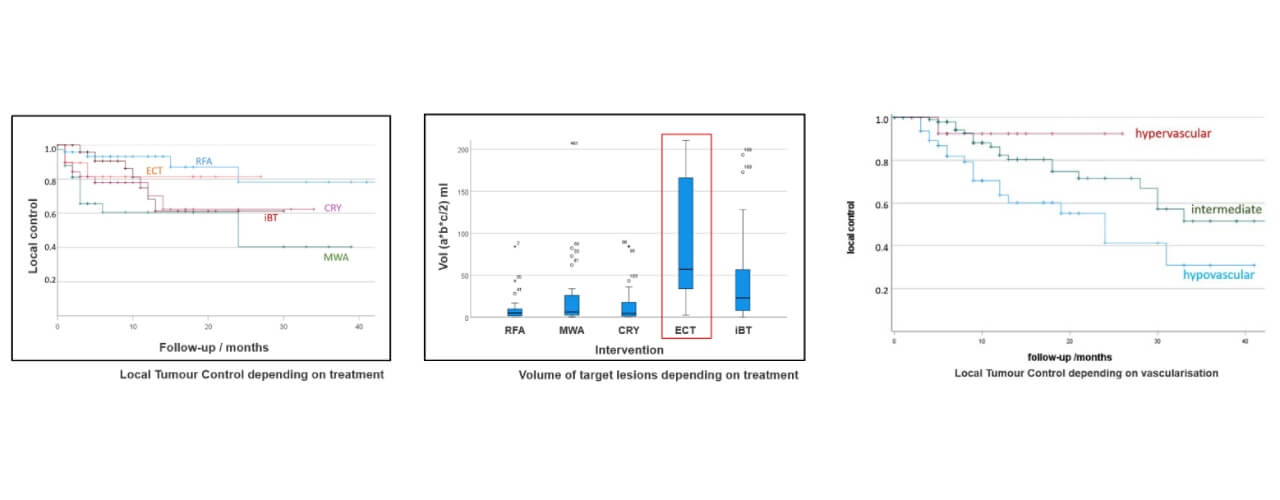
*Kovács A et al. دراسة مقارنة طويلة الأمد حول السيطرة الموضعية على الورم باستخدام تقنيات الاجتثاث المختلفة في أورام الكبد الخبيثة الأولية والثانوية. J Pers Med. 2022 Mar 9;12(3):430
تعزز هذه التصورات الاعتراف المتزايد بـ ECT كخيار علاجي طفيف التوغل عالي الفعالية للسيطرة على سرطان المريء النقيلي، مما يوفر أملاً جديداً حيث فشلت الطرق التقليدية.
العلاج الكيميائي الكهربائي (ECT): علاج للسرطان لا يستخدم الحرارة، أو البرودة، أو الإشعاع
استهداف ورم المريء باستخدام TACE
يُعدّ الانصمام الكيميائي عبر الشرايين TACE تقنية راسخة في علاج أورام الكبد ويُجرى حالياً تكييفها للاستخدام في حالات سرطان المريء المصحوب بنقائل في الكبد أو العقد اللمفاوية. يتضمن الإجراء التوصيل القائم على القسطرة لجرعة عالية من العلاج الكيميائي مباشرةً إلى الشرايين المُغذية للورم، متبوعاً بعوامل انصمامية لمنع تدفق الدم، مما يحبس الدواء داخل الورم. تعمل هذه الطريقة الموضعية على تعظيم السُمية الخلوية مع تقليل التعرض الجهازي إلى أدنى حد.
في سياق سرطان المريء، يُعدّ TACE مفيداً بشكلٍ خاص عندما تقتصر النقائل على الكبد أو العقد اللمفاوية المجاورة للأبهر. فهو يُخفف من عبء الورم، ويُسيطر على الأعراض، وفي بعض الحالات، يؤدي إلى خفض مرحلة المرض بما يكفي لإعادة النظر في خيارات شفائية. وكجزء من استراتيجية أوسع لعلاج الأورام التداخلي، يتم دمج TACE بشكل متزايد في خطط العلاج متعددة الوسائط لمرضى المرحلة المتقدمة.
تسلط الأدلة السريرية الحديثة الضوء على التأثير العملي لـ TACE في مرضى سرطان المريء. تُظهر بيانات النتائج المقارنة، كتلك الواردة في دراسة عام 2024 المنشورة في المجلة العالمية لجراحة الأورام [6]، استجابات إيجابية مواتية قصيرة المدى للورم بعد TACE، مع اختلافات واضحة في معدلات الاستجابة الموضوعية اعتماداً على عبء المرض وتسلسل العلاج.
تؤكد هذه النتائج بشكل أكبر دور الانصمام الكيميائي عبر الشرايين TACE كطريقة علاج موضعية فعالة وقابلة للتطبيق في المرضى المختارين بشكل مناسب.
العلاج الكيميائي الإقليمي لسرطان المريء
عندما ينتشر سرطان المريء خارج نطاق السيطرة الموضعية، غالباً ما يفشل العلاج الكيميائي الجهازي التقليدي – ليس بسبب اختيار دواء غير مناسب، بل بسبب الاختراق غير الكافي للدواء داخل الورم. يُغير العلاج الكيميائي الإقليمي Regional chemotherapy هذه المعادلة من خلال عزل مناطق تشريحية محددة وإغمارها بتركيزات عالية من العوامل السامّة للخلايا بمستويات يستحيل تحقيقها عبر طرق الإعطاء الوريدي القياسية.
يتم استخدام ثلاث تقنيات رئيسية: تقنية التروية الصدرية المعزولة Isolated thoracic perfusion تستهدف المنصف، والرئتين، والعقد اللمفاوية العنقية – وهي أكثر المواقع شيوعاً لانتشار سرطان المريء. بينما تُركز تقنية تروية الجزء العلوي من البطن Upper abdominal perfusion العلاج على النقائل الكبدية والبطنية. أما تقنية التسريب داخل الشرايين Intraarterial infusion فتقوم بتوصيل جرعات عالية من العلاج الكيميائي بشكل مستمر عبر الأوعية الدموية المُغذية للورم. تَستخدم كل تقنية قساطر بالونية تُوضع تحت التوجيه بالتنظير الفلوري لعزل حقل الإرواء، يليها ترشيح الدم في غضون 45 دقيقة للتخلص من السُمية الجهازية.
على سبيل المثال، تم التحقق من النتائج سريرياً من خلال دراسة شملت 14 مريضاً مصاباً بسرطان المريء النقيلي ممن استنفدوا جميع خيارات علاج الخط الأول: بلغ متوسط البقاء على قيد الحياة الكُلي 38 شهراً، مع متوسط بقاء مرتبط بالعلاج الإقليمي 13 شهراً من بدء العلاج. وبلغت معدلات الاستجابة 41٪ استجابة جزئية و 27٪ استقراراً للمرض. وأظهر مرضى سرطان الخلايا الحرشفية استجابات قوية بشكلٍ خاص، مُحَققين متوسط بقاء على قيد الحياة 51 شهراً. [7]
كان البروفيسور كارل راينهارد أيجنر رائداً في تطوير هذه التقنيات وقيادة تطبيقها من خلال عقود من الابتكار السريري. تتناول مقابلته كيف يمكن استخدام التروية الإقليمية لعلاج مرضى سرطان المريء المتقدم.
الدقة القائمة على الحرارة: RFA لتدمير ورم المريء موضعياً
يستخدم الاجتثاث بالترددات الراديوية RFA تيارات كهربائية عالية التردد لتوليد حرارة وتدمير الأنسجة السرطانية. يتم تطبيق هذه الطريقة بشكل شائع في مريء باريت المصحوب بخلل التنسج، ولكن دورها توسع في السنوات الأخيرة ليشمل العلاج الموضعي للآفات النقيلية، وخاصة في الكبد. بالنسبة للمرضى الذين يعانون من سرطان المريء ونقائل الكبد المعزولة، يوفر RFA بديلاً طفيف التوغل للجراحة، مع إمكانية تحقيق سيطرة موضعية وإطالة البقاء على قيد الحياة.
يتم تنفيذ هذا الإجراء عادة عن طريق الجلد تحت توجيه التصوير. وهو مناسب بشكل أفضل للآفات الصغيرة إلى المتوسطة ويمكن تكراره إذا لزم الأمر. بالاقتران مع العلاج الجهازي أو كخيار مستقل بذاته في المرضى غير المناسبين لإجراء الجراحة، يمثل الاجتثاث بالترددات الراديوية RFA أداة مهمة في ترسانة طب الأورام التداخلي.
دقة البرودة: الاجتثاث بالتبريد للسيطرة الموضعية على سرطان المريء
الاجتثاث بالتبريد - الاستئصال بالتبريد Cryoablation يستخدم البرودة الشديدة لتدمير خلايا الورم من خلال دورات تجميد وتذويب سريعة، مما يؤدي إلى تلف خلوي لا رجعة فيه وتوقف وعائي. ورغم استخدامه تقليدياً في طب الأورام الجلدية وأورام المسالك البولية، إلا أن تطبيقه في سرطان المريء يكتسب زخماً متزايداً، وخاصةً لعلاج الآفات الموضعية.
في المرضى الذين يعانون من أورام سطحية، يوفر الاجتثاث بالتبريد بديلاً غير حراري للتقنيات القائمة على الترددات الراديوية، مما يقلل من خطر حدوث انثقاب أو إصابة الأنسجة الجانبية. إنه مفيد بشكل خاص عندما تكون العلاجات السابقة، مثل الإشعاع أو الجراحة، قد حدّت من الخيارات لمزيد من التدخل. في الحالات المتقدمة، يُمكن لـ الاجتثاث بالتبريد أيضاً أن يُحسّن جودة الحياة من خلال تخفيف عسر البلع أو النزيف مع الحفاظ على وظيفة المريء. تدعم البيانات الناشئة سلامته، وقابليته للتكرار، ودوره كجزء من نهج متعدد الوسائط - سواءً كعلاج تلطيفي مستقل بذاته أو بالاشتراك مع العلاج الجهازي.
| نوع العلاج | معدل البقاء على قيد الحياة لمدة عامين | معدل الاستجابة | المدة | الآثار الجانبية |
|---|---|---|---|---|
| العلاجات القياسية | ~55-٪70 للمراحل المبكرة ~٪30 للمراحل المتقدمة | ~٪60-40 | عدة أسابيع إلى أشهر | معتدلة إلى شديدة (تعب، غثيان، عقم، مشاكل الأمعاء/المثانة) |
| الأساليب المبتكرة | ~60-٪75 في حالات متقدمة/مقاومة مختارة | 45-٪65 | ما يصل إلى 4-6 جلسات | خفيفة (حمى، التهاب موضعي، أعراض تشبه أعراض الأنفلونزا) |
*بيانات Booking Health
فرصة جديدة في علاج سرطان المريء: رحلة هارموهان إلى ما هو أبعد من العلاج القياسي
عندما شُخِّصت هارموهان كور من المملكة المتحدة بسرطان المريء، لم تواجه صدمة التشخيص فحسب بل واجهت أيضاً مهمة صعبة تمثلت في اختيار مسار العلاج الصحيح. ولأن العلاجات التقليدية لم تُوفِّر سوى أمل محدود، بدأت بالبحث عن خيارات علاج سرطان المريء في الخارج. قادتها رحلتها إلى ألمانيا، وتحديداً إلى مختبرات LDG، المعروفة على نطاق واسع بأنها أفضل مستشفى لعلاج سرطان المريء، حيث تلقَّت العلاج تحت الرعاية الخبيرة للدكتور جانسوج في بيرج.
من خلال Booking Health، تواصلت هارموهان مع فريق متعدد التخصصات والذي قدم لها ليس فقط رعاية سريرية متقدمة فحسب بل منحها أيضاً شعوراً بالاستقرار خلال فترة عصيبة. "ما يُميز Booking Health هو نهجهم الشخصي المخصص،" تتذكر قائلةً. "إنهم يهتمون بعملائهم حقاً ويبذلون قصارى جهدهم لضمان تجربة سلسة وخالية من التوتر. المرافق الطبية التي يتعاملون معها من الطراز الأول، وشعرت بالثقة في أنني أتلقى رعاية عالية الجودة."
جمعت خطة علاج هارموهان بين التشخيص الدقيق واستراتيجية علاجية مُصممة خصيصاً تجاوزت البروتوكولات التقليدية. اليوم، هي لا تتحدث فقط كشخص ناجٍ من المرض، بل كشخص وجد خيارات حقيقية عندما ظنّ أنه لا وجود لها. قصتها بمثابة تذكير قوي بأن العلاج البديل لسرطان المريء يمكن أن يفتح آفاقاً جديدة، خاصةً عندما يُدار بخبرة ويُقدّم بعناية.
الرعاية الدولية للسرطان: قصص المرضى مع Booking Health
أمل يتجاوز التشخيص: الدعم لحالات سرطان المريء المتقدم وسرطان المريء في المرحلة الرابعة
تشخيص المرحلة الرابعة من سرطان المريء قد يكون أمراً مُرهقاً وشاقاً. بالنسبة للعديد من المرضى، فإنه يجلب حالة من عدم اليقين والريبة، والخوف، والشعور بالإلحاح في العثور على رعاية مُجدية ذات معنى. ولكن حتى في المراحل المُتقدمة، لا يعني العلاج الاستسلام - بل تكييف النهج العلاجي بما يُلبي حالة المريض الحالية وأهدافه.
تقدم المستشفيات المتخصصة الآن خطط علاج فردية تجمع بين استراتيجيات علاجية متعددة، بما في ذلك الجراحة التلطيفية، والعلاج المناعي، والإجراءات التنظيرية، والأشعة التداخلية، والرعاية الداعمة. يتم اختيار هذه الأساليب بعناية بناءً على سلوك الورم، ومدى انتشار النقائل، والحالة الصحية والبدنية العامة للمريض. وبدلاً من الاعتماد على نموذج علاج واحد مُصمم للجميع، يتم تقييم كل حالة بدقة وعُمق لوضع خطة رعاية واقعية ورحيمة.
حتى عندما لم يعُد العلاج الشافي ممكناً، فإن الجمع الصحيح بين الأساليب العلاجية يمكن أن يخفف الأعراض، ويحسن جودة الحياة، وفي بعض الحالات - يطيل فترة البقاء على قيد الحياة. يجد العديد من المرضى وضوحاً وأملاً متجدداً بمجرد حصولهم على توجيه منظم من خدمات التنسيق الدولي والوصول إلى مراكز طبية رفيعة المستوى.
لفهم الإمكانيات الحالية بشكل أفضل، راجع علاج سرطان المريء في المرحلة الرابعة، والذي يشرح العلاجات المتاحة وكيفية مطابقتها لحالة كل مريض.
بغض النظر عن مدى تقدم التشخيص، لا يزال هناك طريقة لاستعادة السيطرة - وأن يتم علاجك بكرامة، ودقة، وأن تحصل على الرعاية التي يستحقها كل شخص.
رحلة طبية: كل خطوة على الطريق مع Booking Health
يُعدّ إيجاد أفضل استراتيجية علاجية لحالتك السريرية مهمة صعبة. فبعد أن أصبحت مرهَقاً ومستنزَفاً من جلسات العلاج المتعددة، واستشارة العديد من المتخصصين، وتجربة مختلف التدخلات العلاجية، قد تشعر بالضياع في كل المعلومات التي يقدمها لك الأطباء. في مثل هذه الحالة، من السهل اختيار خيار مباشر، أو اتباع بروتوكولات علاجية موحدة ذات قائمة طويلة من الآثار الجانبية، بدلاً من اختيار خيارات علاجية مبتكرة عالية التخصص.
لاتخاذ قرار مستنير والحصول على خطة إدارة السرطان الشخصية، والتي سيتم تصميمها لتناسب حالتك السريرية المحددة، استشر الخبراء الطبيين في Booking Health. كونها في طليعة تقديم أحدث الابتكارات الطبية منذ 12 عاماً بالفعل، تمتلك Booking Health خبرة قوية واسعة في وضع برامج علاجية معقدة لإدارة السرطان لكل حالة على حدة. كشركة مرموقة، تقدم Booking Health خطط علاج سرطان المريء الشخصية مع حجز مباشر للمستشفى ودعم كامل في كل مرحلة، من العمليات التنظيمية إلى المساعدة أثناء العلاج. نحن نقدم:
- تقييم وتحليل التقارير الطبية
- تطوير برنامج الرعاية الطبية
- اختيار مكان العلاج المناسب
- إعداد الوثائق الطبية وإرسالها إلى المستشفى المناسب
- استشارات تحضيرية مع الأطباء لتطوير برامج الرعاية الطبية
- نصائح الخبراء أثناء الإقامة في المستشفى
- رعاية المتابعة بعد عودة المريض إلى بلده الأصلي بعد إتمام برنامج الرعاية الطبية
- الاهتمام بالإجراءات الرسمية كجزء من التحضير لبرنامج الرعاية الطبية
- تنسيق وتنظيم إقامة المريض في الخارج
- المساعدة في الحصول على التأشيرات وتذاكر السفر
- منسق شخصي ومترجم فوري مع دعم على مدار الساعة 24/7
- ميزانية شفافة بدون أي تكاليف خفية
الصحة جانب لا يُقدّر بثمن في حياتنا. لذا، ينبغي تفويض إدارة شيء هش للغاية ولكنه ثمين إلى خبراء ذوي خبرة مُثبتة وسُمعة حسنة. Booking Health هي شريك جدير بالثقة يُساعدك في الحصول على صحة أقوى وجودة حياة أفضل. اتصل بمستشارنا الطبي لمعرفة المزيد عن إمكانيات العلاج الشخصي باستخدام طرق مبتكرة لسرطان المريء مع المتخصصين الرائدين في هذا المجال.
الأسئلة الشائعة: علاج سرطان المريء
أرسل طلب للعلاجسرطان المريء Esophageal cancer هو آفة سرطانية تنشأ في بطانة المريء. ويكون إما سرطان غُدي أو سرطان الخلايا الحرشفية. يتطلب سرطان المرئ تحديد مرحلته للجمع بين أساليب العلاج والسيطرة على المرض.
الأعراض الأولية النموذجية تشمل صعوبة البلع، وألم الصدر، والسعال المستمر، وبحة الصوت، وفقدان الوزن غير المُبرر. تُشبه هذه الأعراض إلى حدٍ كبير المشاكل المِعدية المريئية، وبالتالي فإن التشخيص المبكر بالتنظير الداخلي ضروري لتحديد المشكلة وتحسين النتائج.
يبدأ التشخيص بالتنظير الداخلي والخزعة للكشف عن السرطان. يُستخدم التصوير الإضافي لتحديد حجم وانتشار الأورام، ومرحلتها. يُساعد هذا في اتخاذ القرار بشأن الخضوع للجراحة، أو العلاج المساعد الجديد، أو الرعاية التلطيفية، وذلك بناءً على مدى انتشار السرطان.
تُعتبر الجراحة، والعلاج الكيميائي، والعلاج الإشعاعي، والعلاج المناعي هي الخيارات الممكنة. يمكن تطبيق الاستئصال بالتنظير الداخلي أو استئصال المريء طفيف التوغل في المراحل الأولية. يمكن علاج المرض باستخدام العلاج المُركب الموجه والاجتثاثي أو التطعيم بالخلايا المتغصنة Dendritic cell vaccination لإدارة المرض.
عادةً ما يكون سرطان المريء في المرحلة المبكرة قابلاً للشفاء. أما في المراحل الأكثر تطوراً، يكون الهدف هو تحقيق هدأة وإطالة البقاء على قيد الحياة.
في المراحل من الأولى إلى الثالثة، يُوصى عادةً بإزالة الأورام. يمكن استخدامها كمتابعة للعلاج الكيميائي المساعد الجديد أو الإشعاع لتقليص حجم الورم. سيعتمد نوع الجراحة على موقع المرض، ومدى انتشاره، والحالة الصحية العامة للمريض.
استئصال المريء هو إزالة المريء بأكمله. قد تستغرق عملية التعافي أسابيع أو أشهر وتتضمن تعديلات في التغذية ونمط الحياة بالإضافة إلى إعادة التأهيل.
نعم، يُستخدم العلاج الكيميائي على نطاق واسع سواءً في سياق العلاج المساعد الجديد، أو العلاج المساعد، أو العلاج التلطيفي. يتم استخدامة عادةً مع العلاج الإشعاعي أو الجراحة لتقليل حجم الأورام، أو إيقاف التكرار، أو شفاء المرض النقيلي في الحالات المتقدمة.
قد يتم إعطاء العلاج الإشعاعي قبل الجراحة (كعلاج مساعد جديد)، أو بعد الجراحة، أو كإجراء تلطيفي لتخفيف أعراض مثل الألم أو الانسداد. يُستخدم بشكل متكرر كشكل من أشكال العلاج المُركّب، خاصةً عندما تكون الخيارات الجراحية محدودة بسبب السرطان الغازي.
يُعدّ العلاج الكيميائي الكهربائي (ECT)، والانصمام الكيميائي عبر الشرايين (TACE)، والعلاج بالخلايا المتغصنة Dendritic cell therapy، وإجراءات التنظير الداخلي، مثل تركيب الدعامات، من بين التطورات الحديثة. تتمثل مزايا هذه العلاجات الجديدة في فعاليتها العالية، والحد الأدنى من الآثار الجانبية، وهو أمر مفيد بشكلٍ خاص للمرضى الذين يعانون من سرطان المريء غير القابل للجراحة.
يتضمن العلاج المناعي تنشيط جهاز المناعة لاستهداف الخلايا السرطانية. يُعد التطعيم بالخلايا المتغصنة Dendritic cell vaccination واعداً في علاج سرطان المريء النقيلي والمتقدم، لا سيما عندما لا يكون العلاج القياسي فعالاً. ويمكن إدراجه ضمن خطة سريرية أوسع لزيادة البقاء على قيد الحياة وتأخير الانتكاس.
نعم، العلاج الموجه يستهدف الطفرات أو العلامات الموجودة في الورم. يمكن إعطاؤه بمفرده أو جنباً إلى جنب مع العلاج الكيميائي، وخاصةً في حالات السرطان الغُدي (السرطانة الغُدية). يمكن لهذا العلاج الفردي المُخصص أن يُعزز النتائج ويُقلل السُمية.
يُعد تحديد مرحلة المرض أمراً بالغ الأهمية بالنسبة لتوقعات سرطان المرئ. في المرحلة المبكرة، يكون البقاء على قيد الحياة من المرض وإمكانية الشفاء أعلى، بينما في المرحلة الرابعة يكون أقل. حتى في الحالات التي لا يمكن فيها تحقيق هدأة طويلة المدى، تهدف العلاجات الجديدة إلى تعزيز جودة الحياة.
نعم، ينتشر سرطان المريء غالباً إلى العقد اللمفاوية، والكبد، والرئتين، والعظام. يؤثر هذا الانتشار النقيلي على خيارات العلاج والتوقعات، ومع ذلك يمكن استخدام الإدارة الموضعية في شكل اجتثاث، أو إشعاع، أو رعاية تلطيفية.
الآثار الجانبية ليست موحدة ويمكن أن تشمل تعب، أو غثيان، أو صعوبة البلع، أو فقدان الوزن. قد يتأثر الهضم والتغذية أيضاً باستخدام العلاج الكيميائي، والإشعاع، والجراحة. يمكن استخدام الرعاية وتعديلات نمط الحياة لمُعالجة الأعراض وتعزيز التعافي.
نعم، غالباً ما يتم إجراء استئصال المريء طفيف التوغل في ألمانيا. حيث يؤدي إلى تقليل الأذى الجراحي، وتسريع الشفاء، وخفض معدلات المضاعفات مقارنةً بالجراحة المفتوحة.
تختلف الأسعار باختلاف بلد العلاج ونوع العلاج. في ألمانيا، تتراوح تكلفة العلاج الحديث بين 25.000 € و 60.000 €، ويمكن أن تصل تكلفة الجراحات المعقدة أو العلاج المُركّب إلى 70.000 € - 120.000 €. يتم تحديد التكاليف النهائية بناءً على مرحلة المرض والنهج العلاجي المُتبع.
ما هو معدل البقاء على قيد الحياة لمدة عامين لسرطان المريء باستخدام العلاجات القياسية مقارنةً بالأساليب المبتكرة؟
يبلغ معدل البقاء على قيد الحياة لمدة عامين لسرطان المريء حوالي 30٪ في المراحل المتقدمة، عند إدارته باستخدام العلاجات القياسية (مثل العلاج الكيميائي والإشعاع). ومع ذلك، العلاجات المبتكرة (مثل العلاج بالخلايا المتغصنة Dendritic cell therapy و TACE والعلاج الكيميائي الكهربائي Electrochemotherapy وما إلى ذلك) يمكن أن تُحسن البقاء على قيد الحياة إلى حوالي 60-75٪.
ما هي معدلات الاستجابة التي يمكن توقعها في سرطان المريء باستخدام العلاجات القياسية مقابل العلاجات المبتكرة؟
يمكن أن تُظهِر العلاجات القياسية لسرطان المريء معدلات استجابة تبلغ ~40-60٪. في المقابل، الأساليب العلاجية المبتكرة (مثل العلاج بالخلايا المتغصنة أو TACE أو العلاج الكيميائي الكهربائي) يمكن أن تُحقق معدلات استجابة تبلغ ~45-65٪.
دورات العلاج التقليدية لسرطان المريء (مثل العلاج الكيميائي، والعلاج الإشعاعي، وما إلى ذلك) يمكن أن تمتد لعدة أسابيع أو حتى لعده أشهر. من ناحيةً أخرى، فالعلاجات المبتكرة (مثل العلاج بالخلايا المتغصنة و TACE وما إلى ذلك) يمكن إكمالها في 4-6 جلسات مستهدِفة.
يمكن أن تختلف تكلفة علاج سرطان المريء. ففي ألمانيا، تتراوح تكلفة الإجراءات المبتكرة عادةً بين 25.000 € - 60.000 €؛ وفي بريطانيا العظمى والولايات المتحدة الأمريكية، يمكن أن تتجاوز التكاليف 100.000 €. في المقابل، في أستراليا، فإن الوصول إلى العلاجات المبتكرة (مثل العلاج بالخلايا المتغصنة، والأشعة التداخلية، وما إلى ذلك) لا يزال محدوداً؛ كما أنها تُعتبر أغلى بكثير.
لا يوجد علاج واحد مُعين يعتبر «الأفضل» لسرطان المريء حيث يتم تحديد العلاج بناءً على عمق الورم، وتورط العقد الليمفاوية، وقابلية الإستئصال. تُستخدم الأشعة التداخلية للسيطرة الموضعية على نمو الورم أو المضاعفات، بينما يمثل العلاج بالخلايا المتغصنة خياراً قائماً على المناعة يهدف إلى السيطرة على المرض الجهازي (عندما تكون البروتوكولات العلاجية القياسية غير كافية).
أفضل مستشفى هو الذي يستطيع إدارة سرطان المريء بما يتجاوز الجراحة القياسية أو العلاج الكيميائي الإشعاعي. يمكن للمراكز الألمانية ذات الخبرة في طب الأورام التداخلي والعلاج المناعي دمج الإجراءات الموجهة بالصور والعلاج بالخلايا المتغصنة في خطط علاج فردية ㄧ خاصةً للمرض المتقدم أو المتكرر (حيث تكون الخيارات التقليدية محدودة).
اختر العلاج في الخارج وستحصل بالتأكيد على أفضل النتائج!
المؤلفون:
تم تحرير المقال من قبل خبراء طبيين وأطباء معتمدين من مجلس الأطباء الدكتورة ناديجدا إيفانيسوفا و الدكتور بوغدان ميخالنيوك. لعلاج الحالات المشار إليها في المقال، يجب استشارة الطبيب؛ المعلومات الواردة في المقالة ليست مخصصة للتطبيب الذاتي!
سياستنا التحريرية، التي توضح بالتفصيل التزامنا بالدقة والشفافية، متاحة هنا. انقر على هذا الرابط لمراجعة سياساتنا.
المصادر:
[1] American Cancer Society. إحصائيات رئيسية لسرطان المريء.
https://www.cancer.org/cancer/types/esophagus-cancer/about/key-statistics.html
[2] National Cancer Institute. علاج سرطان المريء.
https://www.cancer.gov/types/esophageal/patient/esophageal-treatment-pdq
[3] National Comprehensive Cancer Network. سرطانات المريء والوصلة المريئية المعدية.
https://www.nccn.org/guidelines/guidelines-detail?category=1&id=1433
[4] ESMO: European Society For Medical Oncology. سرطان المريء: دليل الممارسة السريرية من ESMO للتشخيص، والعلاج، والمتابعة.
https://www.annalsofoncology.org/article/S0923-7534(22)01850-6/fulltext
[5] Nobel Prize. رالف ستاينمان واكتشاف الخلايا المتغصنة.
https://www.nobelprize.org/prizes/medicine/2011/steinman/facts/
[6] World Journal of Surgical Oncology. تقييم سريري لعملية الانصمام الكيميائي عبر الشرايين باستخدام oxaliplatin-loaded drug-eluting callispheres beads لسرطان المريء غير القابل للاستئصال أو المتكرر.
https://wjso.biomedcentral.com/articles/10.1186/s12957-024-03546-8
[7] Vashist Y, Aigner K, Dam M, Gailhofer S, Aigner KR. Regional Chemotherapy Is a Valuable Second-Line Approach in Metastatic Esophageal Cancer after Failure to First-Line Palliative Treatment. Curr Oncol. 2022;29(7):4868-4878. https://doi.org/10.3390/curroncol29070386 [DOI]
اقرأ:
سرطان المريء: العلاج في ألمانيا
العلاج بمساعدة الروبوت لأمراض المريء : نظام دافنشي Da Vinci system
قائمة المقالات:
- فهم سرطان المريء ومراحله
- الأساليب القياسية لعلاج سرطان المريء
- العلاجات المبتكرة والناشئة لسرطان المريء
- جدول مُقارن: علاجات سرطان المريء
- فرصة جديدة في علاج سرطان المريء: رحلة هارموهان إلى ما هو أبعد من العلاج القياسي
- أمل يتجاوز التشخيص: الدعم لحالات سرطان المريء المتقدم وسرطان المريء في المرحلة الرابعة
- رحلة طبية: كل خطوة على الطريق مع Booking Health
- الأسئلة الشائعة FAQ: علاج سرطان المريء
لا تعرف من أين تبدأ؟
اتصل بـ Booking Health
